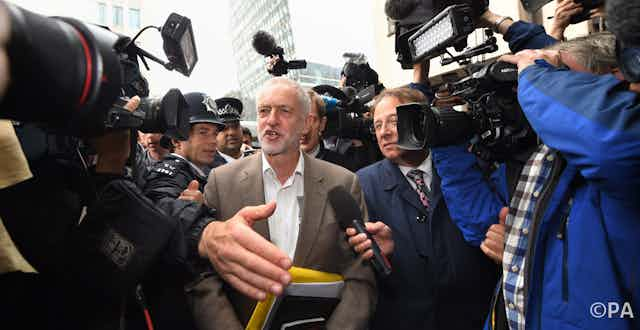Having argued about it constantly since the EU referendum, the Labour Party now, finally, has a leadership contest underway. For the moment, there are three potential candidates. Current leader Jeremy Corbyn is being challenged by two former members of his shadow cabinet – Angela Eagle and Owen Smith. If any of them are to survive the turmoil they will need four things:
Courage
The Labour modernisers of the 1980s and 1990s believed what they were doing. Whatever may be said against Corbyn, he usually does, too. Anyone hoping to be leader has to sound authentic.
The first problem is that nobody is even listening to the party right now. The unfortunate moment when journalists marched out of Eagle’s leadership campaign launch for a more interesting engagement was just the tip of the iceberg. The party has got to do something.
We can quibble on the details but some of the reforms brought in by the 2010-2015 Conservative/Liberal Democrat coalition government were nods in the right direction. Devolution, elements of open public services, and parts of welfare reform, are all examples. The past year has certainly seen the Conservative government veer off course, but if all Labour can offer is blanket opposition and a belief that it can beat the new prime minister, Theresa May, “because she’s a Tory”, then, frankly, it deserves to lose.
This is not appeasement of Toryism. It is strategic communications management. When the opposition agrees with the government on something, it should have the courage to say so. That only helps amplify those areas of genuine disagreement. The low-hum of “nasty Tories” emitted by Labour during Cameron’s tenure has just lost all meaning.

The last five British general elections have been won by the prime ministerial candidate who appears decent enough and willing to build on, rather than just tear down, previous achievements in office. No doubt, some of what Cameron learned from New Labour was for presentation, but not all of it. In any event, whatever can be held against him, any criticisms of Cameron come after six years in Downing Street – not ten months of oppositional bedlam.
Parties which exist in a bubble, only talking to themselves, almost inevitably pay the political price. Labour is currently very much trapped in its bubble. Its leader needs to emerge from it.
Fresh ideas
On foreign policy, it would be great if the Labour leader could actually have a sensible one that accords to the party’s values. Even after Brexit, there are probably new diplomatic “friends” higher up the queue than Cuba and Hamas. Corbyn may have been misquoted on some of this stuff, but the things he gets in trouble for shouldn’t issues at all. The bar isn’t high right now.

On domestic affairs Labour needs a sacrificial lamb to show it is ready to make some tough decisions. This could be the 50p top rate of income tax, it could be corporation tax, or it could be something else. New Labour got this. At the moment the only debate within Labour seems to be between a John Smith-esque desire to tax and spend, and a Corbynista programme of tax and spend plus increased nationalisation.
Better advice
Back in 2015, Labour had an image for being well meaning but bumbling. Now it simply has an image for being toxic. In its own way this transformation is rather impressive. But it means the next leader’s job is more difficult. Commissioning Labour grandee X to conduct a review into areas of policy – as Neil Kinnock attempted in the late 1980s – won’t cut it.
If the next leader is to save Labour’s electability, the party needs an initial push. It needs to seek new ideas post-haste. This was actually something Ed Miliband did rather well, but the next leader needs to cast their net wider when looking for contributors – into the City and into business, small and large.
Charisma
On a basic level, the next leader should be able to read out his or her questions at PMQs without stumbling over their pre-prepared words each week. They should recognise that the “mainstream media” is mainstream because, well, people watch it and read it, and act accordingly. And they should be pleasant to everyone – friend or foe. Refusing to chit-chat to the prime minister at the state opening of parliament frankly made Corbyn look plain odd.
And they should speak like a normal human. Farage’s pint-in-hand shtick is obviously somewhat contrived, but better than Miliband’s imagined world of chats with strangers in the park.
I’m sure there is a lot to disagree with here but the alternative is chaos and then collapse. Whoever plans to stand in this leadership election, the very best of luck to them.

